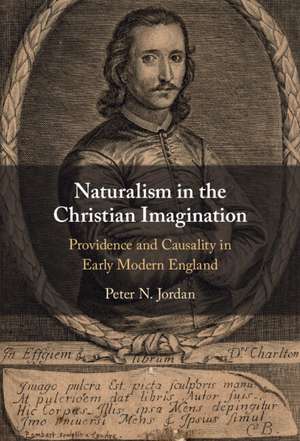Naturalism in the Christian Imagination: Providence and Causality in Early Modern England
Autor Peter N. Jordanen Limba Engleză Hardback – 13 iul 2022
Preț: 580.80 lei
Preț vechi: 652.59 lei
-11% Nou
Puncte Express: 871
Preț estimativ în valută:
111.14€ • 118.84$ • 92.66£
111.14€ • 118.84$ • 92.66£
Carte tipărită la comandă
Livrare economică 18 aprilie-02 mai
Preluare comenzi: 021 569.72.76
Specificații
ISBN-13: 9781009211987
ISBN-10: 1009211986
Pagini: 236
Dimensiuni: 158 x 235 x 17 mm
Greutate: 0.48 kg
Ediția:Nouă
Editura: Cambridge University Press
Colecția Cambridge University Press
Locul publicării:Cambridge, United Kingdom
ISBN-10: 1009211986
Pagini: 236
Dimensiuni: 158 x 235 x 17 mm
Greutate: 0.48 kg
Ediția:Nouă
Editura: Cambridge University Press
Colecția Cambridge University Press
Locul publicării:Cambridge, United Kingdom
Cuprins
Part I. Setting the Scene: 1. Explanation before science and religion; 2. Providence in Early Modern England; Part II. Expanding the Explanatory Scope of Natural Causality: 3. Chance, lots, and games; 4. Prodigies; Part III. Curtailing the Explanatory Ambitions of Naturalistic Philosophies: 5. Atomism; 6. Theories of the Earth; Part IV. Conclusion: 7. Explanation after science and religion.
Recenzii
'This exceptional book is not simply a laudable historical essay on past times. It will acquire a larger and special significance for all who philosophise about science and religion, exposing the many dangers of oversimplification. It will be of special interest to historians and philosophers of religion as well as historians and philosophers of science.' John Hedley Brooke, Fellow of Harris Manchester College, Oxford
'Naturalism in the Christian Imagination is a very interesting, well-researched book built around a central, profound question: 'What bearing should religious convictions have on how phenomena in nature are understood and explained?' This question touches on some of the deepest issues in the study of science and religion, and could be answered in a variety of ways. Peter Jordan argues that it is best answered through a series of grounded historical studies focused on early modern England. That place and time, he contends, provides us with 'flesh-and-blood' thinkers grappling with the problem – who are more helpful than purely philosophical or theological analysis. As well as preventing loose speculation, this kind of historical analysis also helps foreground one of Jordan's primary concerns: how answers to this guiding question should change the way people live their lives in the here and now. The book asks important things and answers them in very interesting ways. The focus on how intellectual issues of providence can affect actual life and practice today will be of great interest to philosophers as well as historians of science.' Matthew Stanley, New York University
'Naturalism in the Christian Imagination is a very interesting, well-researched book built around a central, profound question: 'What bearing should religious convictions have on how phenomena in nature are understood and explained?' This question touches on some of the deepest issues in the study of science and religion, and could be answered in a variety of ways. Peter Jordan argues that it is best answered through a series of grounded historical studies focused on early modern England. That place and time, he contends, provides us with 'flesh-and-blood' thinkers grappling with the problem – who are more helpful than purely philosophical or theological analysis. As well as preventing loose speculation, this kind of historical analysis also helps foreground one of Jordan's primary concerns: how answers to this guiding question should change the way people live their lives in the here and now. The book asks important things and answers them in very interesting ways. The focus on how intellectual issues of providence can affect actual life and practice today will be of great interest to philosophers as well as historians of science.' Matthew Stanley, New York University
Notă biografică
Descriere
A compelling contribution to 'science and religion' debates, showing how early modern thinkers reconciled naturalism with a providential world view.
